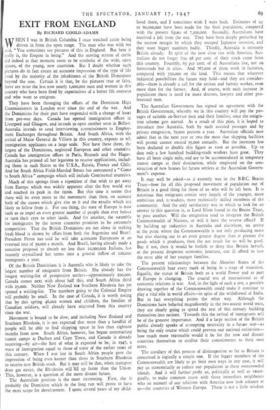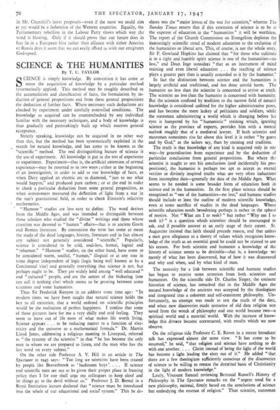EXIT FROM ENGLAND
By RICHARD GOOLD-ADAMS
WHEN I was in British Columbia I once watched cattle being driven in from the open range. The man who was with me said, "You sometimes see pictures of this in England. But here it really is, the Empire in being." And the moving stream of cattle did indeed at that moment seem to be symbolic of the wide, open spaces, of the young, new countries. But I doubt whether such pictures do in fact create an accurate impression of the type of life lived by the majority of the inhabitants of the British Dominions beyond the seas. Certain it is that, be the pictures true or false, there are none the less now nearly r,000,000 men and women in this country who have been fired by expectations of a better life overseas and who want to emigrate.
They have been thronging the offices of the Dominion High Commissioners in London ever since the end of the war. And the Dominions for their part have responded with a change of heart from pre-war days. Canada has opened immigration offices in Liverpool and Glasgow, and intends to open another soon in Belfast. Australia intends to send interviewing commissioners to Employ- ment Exchanges throughout Britain. And South Africa, with the arrival of Major General de Villiers in this country, expects to sift immigration applicants on a large scale. Nor have these three, the largest of the Dominions, neglected European and other countries. Canada has immigration offices in Paris, Brussels and the Hague. Australia has primed all her legations to receive applications, includ- ing those in such States as the U.SA, Russia, France and Chile. And for South Africa Field-Marshal Smuts has announced a "Come to South Africa" campaign which will include Continental countries.
Much of this springs from a repetition of that wish to get away
from Europe which was widely apparent after the first world wai and reached its peak in the 19205. But this time it seems that there will be even more to the movement than then, on account both of the causes which give rise to it and the results which are likely to follow from it. For one thing, the state of Europe is now such as to impel an even greater number of people than ever befoie to turn their eyes to other lands. And for another, the scramble for immigrants by the newer countries promises to be extremely competitive. That the British Dominions are not alone in seeking fresh blood is shown by offers from both the Argentine and Brazil. President Peron has said he will take 4,000,000 Europeans at an eventual rate of 30,000 a month. And Brazil, having already made a tentative proposal to absorb no less than so,000,000 Italians, has recently crystallised her terms into a general inflow of 120,000 immigrants a year.
Of the British Dominions it is Australia who is likely to take the
largest number of emigrants from Britain. She already has the longest waiting-list of prospective settlers—approximately 200,000. Canada comes next with about half this, and South Africa third with 25,000. Neither New Zealand nor Southern Rhodesia has yet opened a waiting-list. The numbers going to the Colonial Empire will probably be small. In the case of Canada, it is worth noting that by this 'spring 46,000 women and children, the families of Canadian soldiers, will already have migrated from this country since the war.
Movement is bound to be slow, and including New Zealand and Southern Rhodesia, it is not expected that more than a handful of people will be able to find shipping space in less than eighteen months from now. South Africa, however, has begun constructing transit camps at Durban and Cape Town, and Canada is already receiving—by air—the first of what is expected to be, in 1947, a wave of immigration equal to those of some of the earlier years of this century. When I was last in South Africa people gave the impression of being even keener than those in Southern Rhodesia to receive new British stock. But it may still be that, when transport does get easier, the Rhodesias will 'fill up faster than the Union. This, however, is a question of the more distant future.
The Australian position is the most interesting. First, she is probably the Dominion which in the long run will prove to have the most scope for development. I spent several years of my child- hood there, and I sometimes wish I were back. Estimates of up to 6o,000,000 have been made for the final population, compared with the present figure of 7,300,000. Secondly, Australians have received a jolt from the war. They have been deeply perturbed by the narrow margin by which they escaped Japanese invasion, and they want bigger numbers badly. Thirdly, Australia is intensely British already. In spite of the now close ties with America, Aus- tralians do not forget that 98 per cent, of their stock came from this country. Fourthly, 63 per cent. of all Australians live, not on farmsteads but in cities. And 767,000 of them work in factories, compared with 330,000 on the land. This means that whatever industrial possibilities the future may hold—and they are consider- able—there is already a call for the artisan and factory worker, even more than for the farmer. And, of course, with each increase in population there is need for more doctors, lawyers and other pro- fessional men.
The Australian Government has signed an agreement with the British Government, whereby we in this country will pay the pas- sages of suitable ex-Service men and their families, once the emigra- tion scheme gets started. As a result of this plan, it is hoped to introduce into Australia, both by such assisted passages and by private emigration, 70,000 persons a year. Australian officials now admit that in the next year or two the most that shipping facilities will permit cannot exceed 35,000 annually. But the intention has been declared to double this figure as soon as possible. Up to date only a few hundred building-trade workers have gone. They have all been single men, and are to be accommodated in temporary transit camps at their destination, while employed on the con- struction of new houses for future settlers at the Australian Govern- ment's expense.
It may well be asked—as it recently was in the B.B.C. Brains Trust—how far all this proposed movement of population out of Britain is a good thing for those of us who will be left here. It is notorious that emigrants consist very largely of the younger, more ambitious and, ncwadays, more technically skilled members of the community. And the only satisfactory way in which to look for an answer to this question is, as Lord Elton found in the Brains Trust, to pose another. Will the emigration tend to integrate the British Commonwealth of Nations, or will it have the reverse effect? If by building up industries in Australia and elsewhere, we arrive at the point where the Commonwealth is not only producing more but also sharing out to an even greater degree than at present the goods which it produces, then the net result for us will be good. But if not, then it would be foolish to deny that Britain herself, at the present desperate economic juncture, can ill afford to lose the most able of her younger families.
The present relationships between the Member States of the Commonwealth bear every mark of being in a stage of transition. Equally, the status of Britain both as a world Power and as part of Europe is changing. The crucial test of international as of economic relations is war. And, in the light of such a test, a possiWe drawing together of the Commonwealth could make it continue to play a vital role in world affairs—in spite of the withdrawal of India. But in fact everything points the other way. Although the Dominions have behaVed magnificently in the two recent world wars, they are clearly going to spend the rest of this century building themselves into nations. Towards this the arrival of immigrants will be of the greatest importance. And if a large section of the British public already speaks of attempting neutrality in a future war—as being the only course which could prevent our national extinction— how much more reasonable would it be for the new and distant countries themselves to confine their commitments to their own areas.
The corollary of this process of disintegration so far as Britain is concerned is logically a simple one. If the bigger members of the Commonwealth are likely to go their own ways in any case, it will pay us economically to reduce our population in these overcrowded islands. And it will further profit us, politically as well as strate- gically, to make common cause with those immediate neighbours who on account of our relations with America now look askance at us—the countries of Western Europe. There is not a little wisdom in Mr. Churchill's latest proposals—even if the most we could aim at yet would be a federation of the Western countries. Eqiially, the Parliamentary rebellinn in the Labour Party shows which way the wind is blowing. Only if it should prove that our future does in fact lie in a European bloc rather than alliance with either America or Russia does it seem that we can really afford to wish our emigrants God-speed.



































 Previous page
Previous page